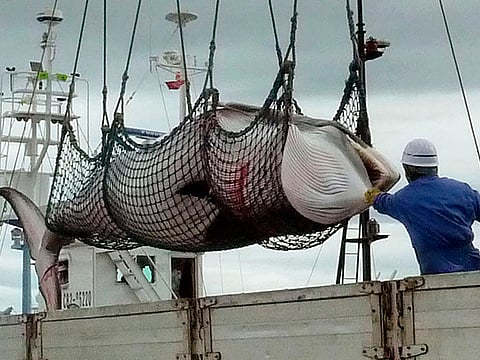Japan faces backlash in whale killing row
Japan has killed more than 1,500 sei whales in 16 years, supposedly in the name of scientific research

Tokyo: Japan's whaling operations have suffered a big setback after the "scientific" hunt for sei whales in the Northern Pacific was effectively declared illegal by an international body that regulates trade in endangered species.
The Standing Committee of the Convention on International Trade in Endangered Species of Wild Fauna and Flora (CITES) found Tuesday that Japan had broken the rules by selling thousands of tonnes of meat from endangered sei whales commercially.
Sei whales are the ninth-largest living animal on the planet, usually growing to between 45 and 60 feet in length and weighing 20 tonnes. They also are among the fastest whales, possessing the ability to swim up to 56km/h. They are found in almost every ocean and sea in the world but were hunted almost to extinction in the 19th and 20th centuries.
Japan has killed more than 1,500 sei whales in 16 years, supposedly in the name of scientific research. It then sells the meat openly in the country, saying it uses the proceeds to fund further research, even though the International Whaling Commission agreed to a global moratorium on commercial whaling in 1982.
But the CITES Standing Committee overwhelmingly ruled that Japan had broken its rules by taking the whale meat from international waters, effectively constituting illegal trade across international boundaries.
"This was an important decision because it was not about the usual whaling politics but about the rule of law," said Erica Jayne Lyman, a professor in the International Environmental Law Project at Lewis and Clark Law School in Portland, Or.
Japan has until February 1, 2019, to remedy its noncompliance and report back to CITES.
"This means Japan must close its domestic market for sei whale meat, which is currently widely available in grocery stores, restaurants and the Internet," Lyman said.
The IUCN Red List of Threatened Species lists sei whales as endangered, with the adult population having declined by about 80 per cent over the past three generations; CITES lists them on Appendix One, meaning international trade in these whales is prohibited. They are thought to number in the tens of thousands globally, but there is no accurate count. The species' Latin name is balaenoptera borealis, which means northern winged whale.
"It is a rebuke," said Mark Simmonds, senior marine scientist at Humane Society International U.K., referring to the ruling. "The key thing is that the great majority of countries do not accept the argument that this is scientific. It's not about science, it's about commercial gain."
The decision is the latest setback for Japan's whaling industry. Last month, a Japanese proposal to reintroduce "sustainable" commercial whaling of four species was rejected by 42 votes to 27 at an International Whaling Commission meeting in Brazil.
In March 2014, the International Court of Justice ruled that Japan's Antarctic hunt had no scientific basis.
In a recent report, the Environmental Investigation Agency (EIA) and the Animal Welfare Institute said Japan, Norway and Iceland had killed 38,539 whales since the moratorium took effect, with more than 22,000 killed by Japanese boats alone.
Wildlife groups say Japan's whale hunt for ostensible research purposes is a thinly veiled attempt to keep the commercial whaling industry alive, ensuring boats, skills and a market for whale meat are maintained.
Danielle Grabiel, senior wildlife policy analyst for the EIA's U.S. office, called the decision a "big deal" and a referendum on Japan's whaling programs.
"Two international bodies - the International Court of Justice and now CITES - have concluded that Japan's whaling operations violate international law," she said Wednesday. "Regarding yesterday's decision specifically, it is difficult to see how Japan can continue hunting sei whales and address the concerns raised by CITES."
Sue Fisher, a lawyer with the Animal Welfare Institute, said that if Japan did not end the commercial trade in sei whales, CITES could impose sanctions on trade with Japan involving all CITES-managed species, ranging from tropical timber to reptile skins.



